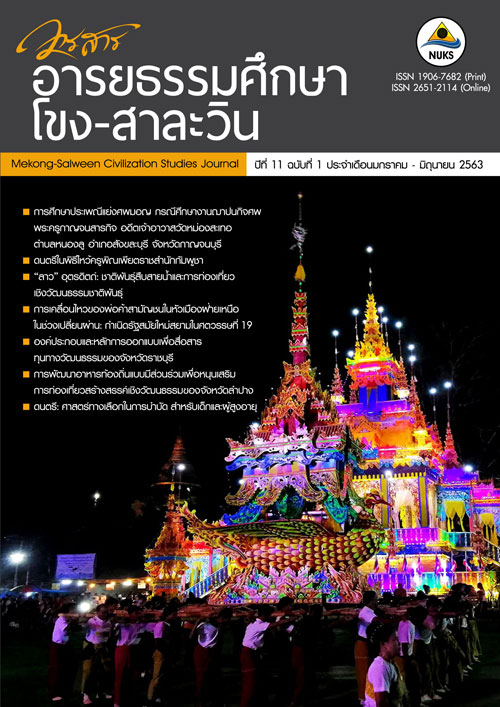The Participatory Development of Local Food to Support Cultural-Creative Tourism in Lampang Province
Main Article Content
Abstract
This research aimed to analyze and categorize an authentic local food on a participatory basis. Furthermore, it aimed to develop and create added value for local food to conserve and inherit the unique local food through cultural-creative tourism. The sample of this research was a group of 50 people from 5 districts of Lampang consisting of Khokha District, Muangpan District, Chaehom District, Wangnua District, and Ngao Districts. This participatory action research used in-depth interview, focus group discussion, observation, knowledge sharing activity of local communities, and document research. It was revealed that, for the local food of all 5 districts in Lampang Province, their ingredients could be found easily from local areas and natural resources. Some can be bought in local markets, and some were fed by local people, such as chickens, pigs, and fish. There are some local and seasonal vegetables which were used as food ingredients and could be found in natural surroundings such as puff-ball mushroom, gooseberry leaves, and bamboo shoot. Regarding food preparation, it could be categorized according to the traditional cooking techniques which were currying, roasting, crushing, and making of chili sauce and spicy minced meat salad. From the development and creating added value for local food, the participants from 5 districts agreed to select 3 dishes to add their value, namely mixed local vegetable chicken curry, crab-gravy dip, and bamboo shoot curry. In the developing phase, the researcher applied a local wisdom for creative development concept which consisted of 1) conservation, 2) application, and 3) recreation. As a result, these 3 local dishes led to establish a touristic activity to support area-based tourism which was a local cooking class. In other words, it was a community’s participative activity. This activity could create learning and new cooking experience for tourists.
Downloads
Article Details
References
Booparkob,Y., Wongmanee,J., Khetjenkarn,S., & Sawangdee,Y. (2017). The Role of Local Cuisines in
Creative Tourism Process: A Case Study of Lao Khrang Ethnic Group in Chai Nat Province.
Dusit Thani College Journal, 11 Special, 93-105.
Chaikhan, S., Achariya, S., Tiwarat, S., Thavonsak, T., Pohvisay, S., & Onphachanh, X. (2013). Investigating the Potentials of Traditional Food and Tourism of the World heritage Town of Luang Prabang for the ASEAN Community Preparation. Academic conference 4th Sustainable Rural Development 2014 (pp. 650-657).
Chiangmai University Library. (June 8, 2018). Lannafood. Retrieved June 8, 2018, from
http://library.cmu.ac.th/ntic/lannafood
Chim Ban Rai, H. & Wongsarot, R. (2015). Potential of Local Food and Guidelines for Tourism
Promotion through Local Food of Nan Province. Journal of International and Thai Tourism,
(1), 37-53.
Choibamroong, T. (2012). Wisdom for Local Development. Bangkok : King Prajadhipok’s
Institute the Government Complex Commemorating. A.P. Graphic Design and Printing Ltd.
Department of Tourism (2017). Creative Tourism Destination Management. Bangkok : Author.
Designated Areas for Sustainable Tourism Administration (Public Organization) : DASTA (2018).
Creating Creative tourism Toolkit. Bangkok : perfect link consulting Group co,.ltd.
Keemgratok, T., Sriwiset, P., & Sainate, C. (2018). Local Food Development of Sanuannok Village,
Sanuan Sub-District, Huai Rat District, Buriram Province to serve as sport city. Journal of
Selaphum Academic, 4(2), 9-25.
Krishanapakornkit, W. (2017). Foodie Food Tourism Trend 2017. TAT Review, 3(1), 27-35.
Scarpato, R. (2002). Gastronomy as a tourist product: The perspective of gastronomy
studies, in A.M.Hjalager and G. Richards (eds.), Tourism and gastronomy. London:
Routledge.
Sungsuwan, T. (2018). Creative Tourism Activities at Koh Samed Island. Dusit Thani College
Journal, 12 Special, 356-367.
Suwannapha, C., Woowong, O., & Suphametheesakul, S. (2018). Local Food: The Management
Process for the Quality of Life and Social Ethics in Northern Communities. Journal of MCU Peace Studies, 6(4), (1306-1319).
Thongmee, O. (2015). The Cultural of Lanna Food : The Develop to Creative Economy. Journal
of Art Klong Hok, 2(1), 25-54.


